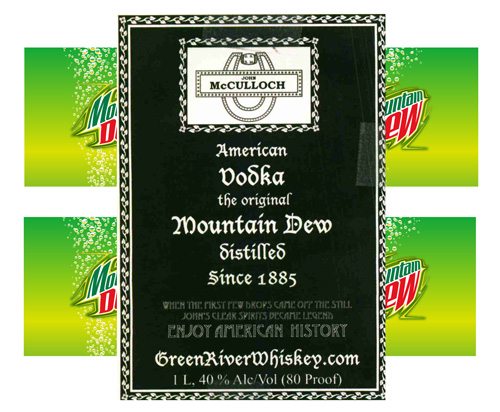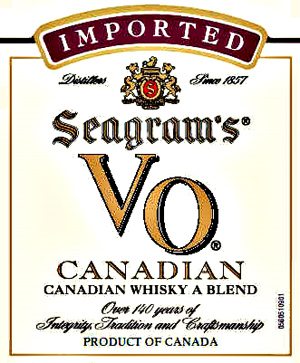Part of the challenge and complexity is that label rules and trends change often. As recently as a few years ago, TTB would balk about pre-eminently famous people, such as these, on alcohol beverage labels. Founding Fathers Beer is bottled by CBC Latrobe in Latrobe, Pennsylvania. I tend to doubt that TTB would allow a President Obama label, even today (except maybe as a caricature), but George Bush, Bill Clinton and the prior Presidents may well be fair game now or soon.
Continue Reading Leave a Commenthistory
COLAs on the Front Page

It’s not every day that you see COLA news on the front page of the newspaper, but it does happen from time to time. On Saturday, The Wall Street Journal featured COLA news on the front page. The story explained that no less than three companies have been trying to use Buffalo Bill as part of their branding — with two of them fighting it out in court. “The two entrepreneurs are fighting in court for the exclusive right to sell beer that trades on the musky aura of adventure surrounding Army-scout-turned-bison-hunter-turned-sharpshooting-showman William F. Cody.” Eric Bischoff got his first COLA in March of 2011 (and the second one is here). He is a “former professional wrestling icon.” While Bischoff already has the COLAs and applied for the trademark, it looks like Mike Darby has been selling beer under the Buffalo Bill name since before Bischoff. But “Mr. Darby failed to get federal approval of his label, as required by the law. (Mr. Darby says he thought the brewer and distributor had taken care of that.)” Darby owns a hotel in Cody, Wyoming “built by Buffalo Bill in 1902.” Darby “had to pull his beer from the market” while awaiting label approval. The third company is affiliated with Bill Owens, but is not interested...
Continue Reading Leave a CommentTags: famous, history, media buzz, trademarks-beverage
The Original Mountain Dew

I would have thought John Robert McCulloch would get his keester sued off. But maybe he’s right and it’s the soda people who grabbed his brand and ran with it. The approval mentions that “Mountain Dew is the brand John McCulloch sold vodka under from 1885 until put out of business by Prohibition.” I’d wager that’s earlier than Pepsi or any of its forebearers put the lithiated green soda into commerce. As it turns out, Wikipedia confirms that: “The original formula (for the soda) was invented in the 1940s by two Tennessee beverage bottlers, Barney and Ally Hartman, and was first marketed in Marion, VA, Knoxville and Johnson City, Tennessee. … The Mountain Dew brand and production rights were acquired by PepsiCo in 1964, at which point its distribution expanded more widely across the United States.” The Hartmans got the name from “a colloquial term for moonshine whiskey” and got the trademark rights soon after. The McCulloch website makes it quite clear that Mountain Dew was widely used on spirits well before the soda came along. The site also has a lot of old-fashioned spirits advertising, along with the quaint and none too subtle tagline “The Whiskey Without a Headache.”
Continue Reading Leave a CommentTags: drinkwire, history, trademarks-beverage
TTB Products from Majority Muslim Countries

I can find plenty of alcohol beverages made in Romania, for example, from the above lookup at TTB’s website. But I can’t find anything from Saudi Arabia. Oh yes, it’s easy to say that Saudi Arabia is a major, majority-Muslim country and so I should not expect to find a single drop of alcohol beverages flowing out from or in to that country. Wikipedia says no less than 100% of the population is Muslim. On the other hand, Turkey has far more Muslims, at 99% of the population — and no less than 370 label approvals in the TTB database. A recent wine approval is here. Indonesia has more Muslims than any other country and also has about 25 label approvals in the database. Here is Panther Beer. Algeria has at least a few approvals. A wine example is here. Morocco has a few hundred approvals, with a recent wine example here. Egypt has a code, but I don’t see any approvals. Rounding out the top 14 Muslim countries, the following countries (in addition to Saudi Arabia) do not even have a TTB lookup code: Afghanistan, Bangladesh, Iran, Iraq, Malaysia, Pakistan, Sudan. Some of these countries are so strict that not even soy sauce or vanilla extract is tolerated.
Continue Reading Leave a CommentGood Flags and Bad Flags

In many situations, TTB will not allow national flags, and especially not the US flag. The regulations support this. So the above labels seem to be noteworthy exceptions. Maize Valley Winery’s Redneck Red wine shows The American Flag on the main label, alongside The Confederate Flag. In the second example, The American Flag appears with the Military Flag of Japan. The wine is made by D’Vine Wine of Fredricksburg, Texas. A notable instance where TTB did not allow the US flag is on this New Hampshire beer.
Continue Reading Leave a CommentTags: history, legally interesting/controversial, policy, political
Seagram

The Seagram name still carries a lot of weight, even though the company got obliterated about ten years ago. Wiki says The Seagram Company Ltd. (headquartered in Montreal, Canada) became “defunct” in 2000. Until then it was “the world’s largest producer and distributor of spirits and wines.” The brands live on. TTB’s database shows more than 500 approvals, with the brand name “Seagram,” within the past three years. This excludes famous brands formerly owned by Seagram, such as Chivas, Crown Royal, Martell, Captain Morgan, etc. The City of Waterloo’s history makes the point that “like so many success stories,” Joseph E. Seagram’s early success was “almost accidental.” Joseph was asked to look after an Ontario grain mill, back in 1864, while the owner traveled to Europe. The main business was grinding flour. Distilling was a side issue, to use up excess grain, but Seagram began buying out his colleagues and shifting production from flour to spirits. The Bronfman family acquired Joseph E. Seagram & Sons in 1928. In another “almost accidental” quirk of history, “Bronfman” means “liquor man” in Yiddish. Here is a great song that happens to feature Seagram (in a not entirely flattering light). It is Uncle Lloyd by Darrell Scott. The pertinent lyrics explain:
Continue Reading Leave a CommentHe and Dad...
Tags: famous, history, music-booze-society


